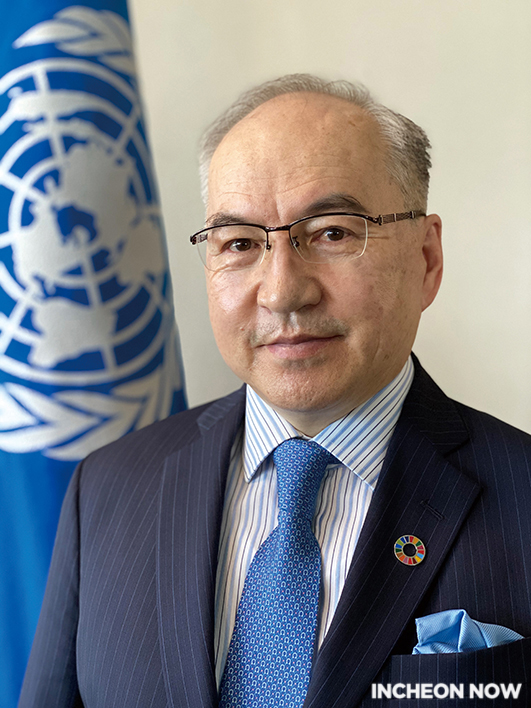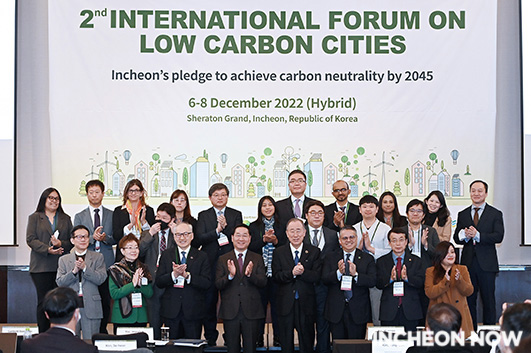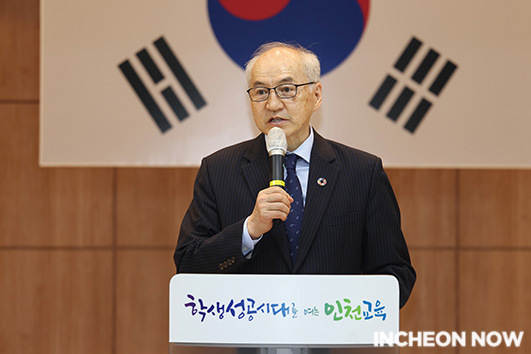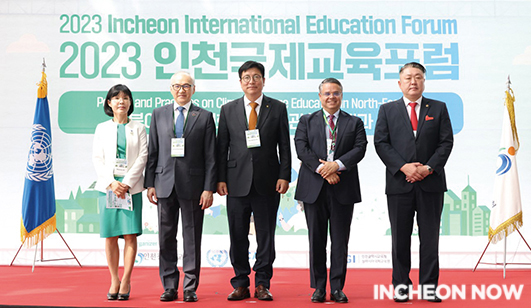[Beyond Borders]
WORKING WITHIN THE COOPERATION FOR THE DEVELOPMENT OF NORTHEAST ASIA

+Interviewee
Ganbold Baasanjav
Head of East and North-East Asia Office of United Nations ESCAP
There is an organization working together to promote economic and social development in the Asia-Pacific region. UNESCAP North-East Asia Office proposes policies at the national and regional levels and activates international partnerships. Let’s hear from Director Ganbold Baasanjav, who is at the forefront of finding common issues and thinking about creating a better future.
Q. Thank you for giving an interview with Incheon Now, Incheon’s English newsletter.
You are currently the Head of the East and North-East Asia Office of United Nations ESCAP. Could you explain how you became appointed?
A. I joined the United Nations ESCAP as Head of the East and North-East Asia Office in January 2019. The position was open for competitive recruitment. I responded to the open hiring, given the role aligned with my work experience and professional interest on intergovernmental processes and sustainable development. I also welcomed the opportunity to once again be located in the Republic of Korea, having had good memories of my stay in the country from my stint as Ambassador of Mongolia from 2013 to 2018.
Q. The East and North-East Asia Office of United Nations ESCAP was established under a UN General Assembly resolution in 2010. Since then, it has operated primarily in Incheon. Could you explain the office's roles?
A. ESCAP East and North-East Asia Office (ENEA Office) is the primary subregional platform to build and strengthen multilateral partnerships and intergovernmental cooperation for inclusive and sustainable development and integration in Northeast Asia. It is the subregional arm of the Economic and Social Commission for Asia and the Pacific, which is based in Bangkok (Thailand).
ENEA Office bridges the developing and developed countries in the subregion and works with its six member States (i.e., China, Democratic People's Republic of Korea, Japan, Mongolia, Republic of Korea and the Russian Federation) and two associate members (i.e., Hong Kong, China and Macao, China).
ENEA Office convenes stakeholders and provides a neutral platform generating joint actions towards achieving shared priorities in North-East Asia on environmental sustainability, sustainable connectivity and innovation for inclusive and resilient societies.
Across these priorities, the ENEA Office delivers its work through facilitating intergovernmental processes and multistakeholder partnerships; generating evidence-based and action-oriented analysis; and well-targeted technical assistance and capacity-building support.

DEC 6~8 2022_2nd International Forum on Low Carbon Cities.
Q. What is the main factor behind the strong solidarity of the Northeast Asia region?
A. It is important to understand the dynamics and characteristics of North-East Asia in order to identify common grounds and mutual interests harnessing strong solidarity. North-East Asia is diverse. High-tech market economies, command economies and resource driven economies are present in the subregion. Political and geopolitical outlooks and priorities are vastly different.
Due to these diverse approaches of development and complex country relationships, the subregion has to look for common goals to build solidarity. To this end, the unifying factor is the 2030 Agenda for Sustainable Development. It stands as a universal agenda, valid for all countries (i.e., developed, developing, and middle-income), while taking into account different levels of national development and capacities.
Q. You are also discussing environmental issues in various ways and seeking solutions. Please introduce significant achievements and any important projects you are currently carrying out.
A. ESCAP East and North-East Asia Office (ENEA Office) has promoted environmental cooperation among countries in North-East Asia through the North-East Asian Subregional Programme for Environmental Cooperation (NEASPEC). Serving as NEASPEC Secretariat, ENEA Office works with countries to advance joint actions on air pollution, nature conservation, desertification and land degradation, low-carbon cities, and marine protected areas.
We all recognize the urgent call to action to combat climate change and its impacts. In May 2023, countries in the Asia-Pacific region during the 79th ESCAP Commission session adopted the resolution Accelerating climate action in Asia and the Pacific for sustainable development.
ENEA Office has strengthened its engagements with countries raising awareness of sustainable development challenges from climate change. ENEA Office launched the International Forum on Low-Carbon Cities (LCC), jointly with the Incheon Metropolitan City. Thanks to the unwavering commitment from Incheon and other partner cities, the LCC Forum is going strong and the 4th LCC Forum will be held on 8-9 October 2024 in Kitakyushu, Japan. Also, ENEA Office is in in collaboration with the Trilateral Cooperation Secretariat (TCS) in holding the annual Forum on Carbon Neutrality Goals of China, Japan, and the Republic of Korea. During the 3rd Forum held in March this year, insightful perspectives were shared by Incheon in accelerating progress to achieving carbon neutrality goals through digital innovation.
Environmental sustainability is a major pillar of our work in North-East Asia and there is a myriad of issues. We envisage strengthening further our collaborations with partners and stakeholders, including Incheon Metropolitan City, through developing new projects and activities.
Q. You previously served as the Mongolian Ambassador. Could you tell us about your story then?
A. I served as an Ambassador of Mongolia to the Republic of Korea from 2013 to 2018. I brought with me the rich experiences from my background in international relations and foreign studies as well as postings in other Asia-Pacific countries. It was during this period that Mongolia approved its long-term strategic Sustainable Development Vision (SDV) 2030 in February 2016. As such, I had the opportunity during my tenure to facilitate stronger partnerships between Mongolia and the Republic of Korea on shared interests in line with sustainable development.

Apr 13 2024_Congratulatiory Remarks at the Incheon Glocal Ledership Programme
Q. You have lived in Korea long since your days as the Mongolian Ambassador and have built relationships here. Could you tell us about the image of Korea that you have in mind?
A. A Global Pivotal State fittingly embodies the Republic of Korea. I have seen this image strengthened and translated into action from my professional and personal engagements in the country through the years working as a public official in foreign affairs to my current work now in the development world. Korea has become a champion of promoting innovative solutions to critical issues of our times, including on environmental issues. Also, Korea is generous in sharing its culture and practices. This generosity is rewarded, as we are all aware of the global phenomenon of how the world has embraced Korean culture.
Q. We would also like to know your first impression of Incheon. Also, you have been living in Songdo for a long time. Please tell us an anecdote where you were impressed about Incheon’s growth, if there is any.
A. The progress in Incheon has grown from strength to strength through the years, as I have witnessed firsthand having taken residence in Songdo since I joined ENEA Office in January 2019. The infrastructure support is first class, and the convenience afforded to the whole community, local and expatriates alike, is invaluable. I especially welcome the mindfulness in ensuring a good balance between the dynamic pace of new developments and keeping sustainable common spaces for the community to enjoy.
Q. Incheon declared the 2045 Carbon Neutral Strategy and is working to reduce greenhouse gases. What do you think about Incheon's actions?
A. It is very encouraging to witness Incheon taking the leadership role in the global efforts to reduce greenhouse gas emissions. Incheon’s 2045 Carbon Neutral Strategy, being five years ahead of the Global 2050 Carbon Neutral Strategy, reflects a proactive approach and a visionary commitment to addressing the urgent challenges posed by climate change. Incheon’s leadership validates the important role of local governments in accelerating progress in sustainable development.
ENEA Office has facilitated urgent climate actions of various stakeholders in North-East Asia, in close collaboration with the Government of the Republic of Korea and the Incheon Metropolitan City Government.
Incheon’s Strategy to move ahead and achieve carbon neutrality by 2045 serves as a compass to steer other cities in North-East Asia and beyond to raise their ambitions and join forces in addressing the climate crisis. ENEA Office stands ready to support Incheon in bringing into fruition its Strategy and, in the process, collaborate with the City Government in sharing Incheon’s policy and experiences with other cities and stakeholders.

May 30~31 2023_Incheon International Education Forum
Q. Incheon has embraced the vision of 10 Million Incheon with the launch of the Overseas Koreans Agency. The next step of Incheon is to leap forward as a ‘Global Top Ten City.’ What do you think is the competitive edge of Incheon while it makes efforts to turn into one of the world’s centers?
A. I would like to congratulate Incheon for hosting the Overseas Koreans Agency. It is truly meaningful and fitting that Incheon embraced the agency, considering Incheon has served as the main port of departure for many Korean emigrants to abroad. Incheon has great potentials to grow as a truly globalized city with its well-established infrastructure and multicultural international communities.
Connectivity is one of the key competitive advantages of Incheon. The Incheon International Airport, along with the Incheon harbor and highways, are gateways connecting the world with the Republic of Korea. South Koreans meet the world through Incheon and the world sees its first glimpse of the Republic of Korea through Incheon.
Incheon is also uniquely positioned in its ability to find the good balance of blending its rich history and culture with the attractions of modern developments. In addition, the growing presence of multi-cultural communities embracing the local lifestyles will greatly help the development of a diverse and inclusive society.
Q. Do you have any words for Incheon’s citizens, 10 million overseas Koreans, and foreigners visiting Incheon?
A. To Incheon citizens, I share the joy and gratitude of many from the expatriate community being part of the Incheon community. The inclusive atmosphere you created in our local communities have forged meaningful relationships and made Incheon our home away from home. It is an honor for ESCAP East and Northeast Asia Office to be a part of this journey, contributing to and sharing in Incheon’s remarkable development.
To the 10 million overseas Koreans, as you discover new shores and endeavors, let your connections to Republic of Korea, your home country, remain warm and steadfast. Whether near or far, your contributions continue to play an important role in our collective progress. Incheon is always ready to welcome you back as you disembark from that journey bringing you to your home soil.
To foreigners visiting Incheon, I encourage you to discover the multi-faceted wonders of Incheon! The attractions are not solely its landmarks, but also its people.